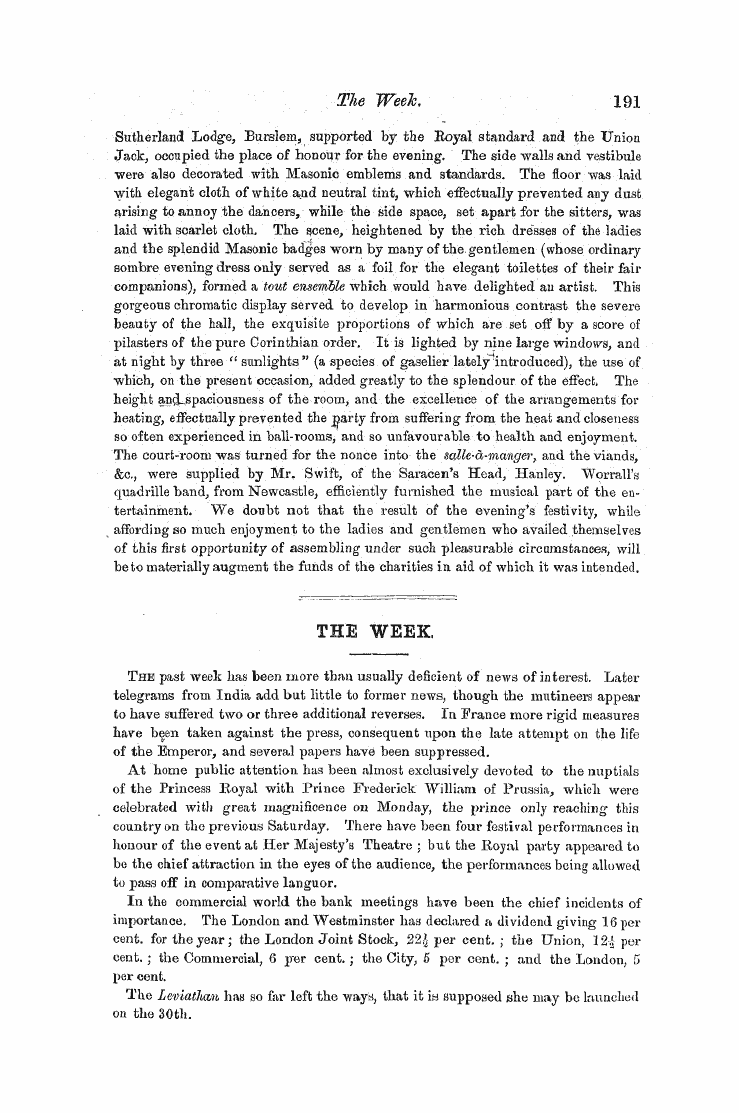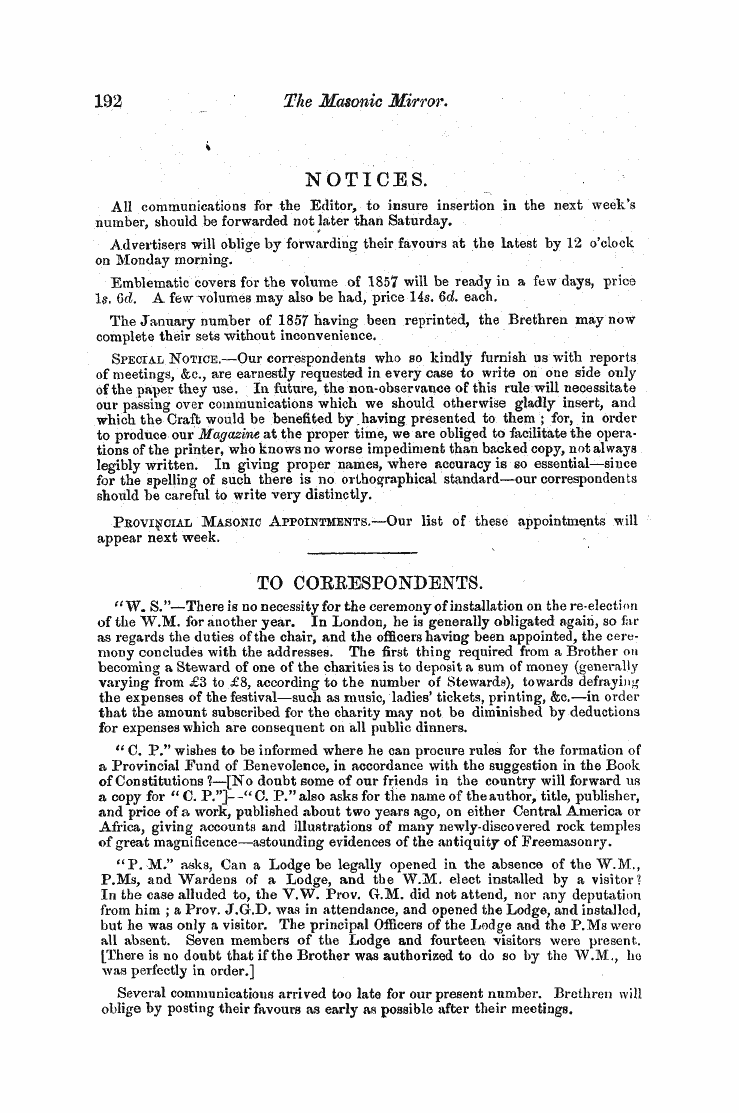-
Articles/Ads
Article FBEEMASONRY ILLUSTRATED. ← Page 7 of 16 →
Note: This text has been automatically extracted via Optical Character Recognition (OCR) software.
Fbeemasonry Illustrated.
the first six or seven years no addition was made to the number . J > e Payens , who was then styled their master , and his friend St . Omer , had but one horse between tliem—a circumstance commemorated on the seal of the Order , which represents two armed Knights mounted one behind the other on the same horse .
The rule of the Order , which had received the sanction of the council of Troyes , was confirmed by Pope Honoring XL , and thus may the Knights be said to have been first embodied ; he , at the same time , to distinguish them from the Hospitallers , assigned the ^ Temp lars for their peculiar dress a white mantle , which they wore plain till 1146 , when Eugenius III . appointed them to wear a red cross on the left breast . This blood-red cross was also to be borne on their banner , which was
formed of cloth striped black and white , and hence called Beauseant an old French term for a horse marked with those colours ; this term in time became the war-cry of the Templars . The system of government of the Templars was precisely that of the Freemasons ; at their head was an officer styled the Grand Master , whose place of residence , with the several officers , as Lieutenant or Deputy , " Treasurer , & c , was in Palestine—first at
Jerusalem , and afterwards at Acre ; and as the Order speedily rose into consideration , members of several noble families in Europe eagerly sought to be joined to it , and ihanors , lands , and moneys , were poured into its treasury . Subordinate chapters were instituted , which in each country were governed by a superior officer , under the supreme authority in Palestine , — the superior officer in the diiferent countries being denominated Grand Prior or Master—the title of Grand Master being confined to the supreme
head . In some instances the provincial Masters were styled Preceptors , and the house was hence called a Preceptory . ^ Although the sanction of the church had been given to its proceedings , yet , until the year 1162 , the Order consisted exclusively of laymen . At that time Pope Alexander III . issued the famous bull styled " Omne datum optimum , " * which was addressed " to his beloved sons Odo , Master of the religious chivalry of the Temple , which is situated at Jerusalem , and to his successors , and to all . regularly professed
Brethren / ' This not only confirmed all their former privileges , but conferred upon them additional powers and immunities . They were permitted to receive as members any spiritual persons who were not bound by previous vows . These spiritual members were called Chaplains ; they did not take the military vow ; they celebrated mass and other religious offices in the houses , and usually acted as
secretaries ; but it appears they were not allowed to take any part m the government of the Order . They were exempted from all duties to ecclesiastics of every kind ; and the bull expressly conferred on the fraternity the important privilege of causing the churches of towns and villages lying under the sentence of interdict to be opened once
* The first words of the document were— " Every good gift , and every perfect reward cometh from above . "
Note: This text has been automatically extracted via Optical Character Recognition (OCR) software.
Fbeemasonry Illustrated.
the first six or seven years no addition was made to the number . J > e Payens , who was then styled their master , and his friend St . Omer , had but one horse between tliem—a circumstance commemorated on the seal of the Order , which represents two armed Knights mounted one behind the other on the same horse .
The rule of the Order , which had received the sanction of the council of Troyes , was confirmed by Pope Honoring XL , and thus may the Knights be said to have been first embodied ; he , at the same time , to distinguish them from the Hospitallers , assigned the ^ Temp lars for their peculiar dress a white mantle , which they wore plain till 1146 , when Eugenius III . appointed them to wear a red cross on the left breast . This blood-red cross was also to be borne on their banner , which was
formed of cloth striped black and white , and hence called Beauseant an old French term for a horse marked with those colours ; this term in time became the war-cry of the Templars . The system of government of the Templars was precisely that of the Freemasons ; at their head was an officer styled the Grand Master , whose place of residence , with the several officers , as Lieutenant or Deputy , " Treasurer , & c , was in Palestine—first at
Jerusalem , and afterwards at Acre ; and as the Order speedily rose into consideration , members of several noble families in Europe eagerly sought to be joined to it , and ihanors , lands , and moneys , were poured into its treasury . Subordinate chapters were instituted , which in each country were governed by a superior officer , under the supreme authority in Palestine , — the superior officer in the diiferent countries being denominated Grand Prior or Master—the title of Grand Master being confined to the supreme
head . In some instances the provincial Masters were styled Preceptors , and the house was hence called a Preceptory . ^ Although the sanction of the church had been given to its proceedings , yet , until the year 1162 , the Order consisted exclusively of laymen . At that time Pope Alexander III . issued the famous bull styled " Omne datum optimum , " * which was addressed " to his beloved sons Odo , Master of the religious chivalry of the Temple , which is situated at Jerusalem , and to his successors , and to all . regularly professed
Brethren / ' This not only confirmed all their former privileges , but conferred upon them additional powers and immunities . They were permitted to receive as members any spiritual persons who were not bound by previous vows . These spiritual members were called Chaplains ; they did not take the military vow ; they celebrated mass and other religious offices in the houses , and usually acted as
secretaries ; but it appears they were not allowed to take any part m the government of the Order . They were exempted from all duties to ecclesiastics of every kind ; and the bull expressly conferred on the fraternity the important privilege of causing the churches of towns and villages lying under the sentence of interdict to be opened once
* The first words of the document were— " Every good gift , and every perfect reward cometh from above . "
































































































































































































